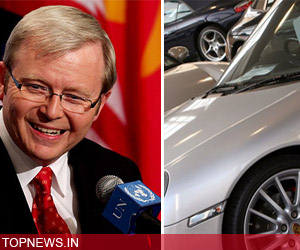Australian motorists bail out carmakers
 Sydney - Australia's three foreign-owned carmakers will receive subsidies worth 6.2 billion Australian dollars (4.3 billion US dollars) over the next 13 years, Prime Minister Kevin Rudd said Monday.
Sydney - Australia's three foreign-owned carmakers will receive subsidies worth 6.2 billion Australian dollars (4.3 billion US dollars) over the next 13 years, Prime Minister Kevin Rudd said Monday.
Around 20 per cent of the cash going to Toyota Motor Corp, GM Holden Ltd and the Ford Motor Co will be reserved for hybrids and low-emission vehicles.
Australia's automotive trio roll out petrol-thirsty six-cylinder cars that have lost their appeal in the local market because of higher petrol prices and environmental concerns.
Rudd said the taxpayer should help them tool up to make the vehicles that the market wants.
"I don't believe that carmaking is yesterday's business or something better left to the Germans and Japanese," Rudd said. "But I also don't believe that industry policy is about saving the automotive industry. It's about helping transform the industry to meet the challenges of the future."
Not surprisingly, the manufacturers expressed delight at the package.
"We think, on balance, it provides a platform for the industry to move forward with," Ford chief Marin Burela said. Holden spokesman Jason Laird said Canberra "wants us to look at greener cars and this is a step forward in that direction." Toyota chief Max Yasuda seconded the view of his competitors.
Rudd, who denied that subsidies amounted to protection, said import tariffs would go down from 10 per cent to 5 per cent in 2010 despite demands from the industry and unions that they remain at current levels.
"I don't believe we can or should shield our industry from free trade and open markets," he said.
A Melbourne University economist said the government was throwing good money after bad because the industry had become a mendicant with each vehicle produced carrying a 4,000-Australian-dollar taxpayer subsidy. "The market should be allowed to work," he said.
The three carmakers have seen their share of the local market fall over the last 10 years from 44 per cent to 20 per cent. The trio get by on sales of six-cylinder cars to Middle East countries where petrol is cheap and few people worry about emissions.
Around a third of total annual production is sent abroad. (dpa)